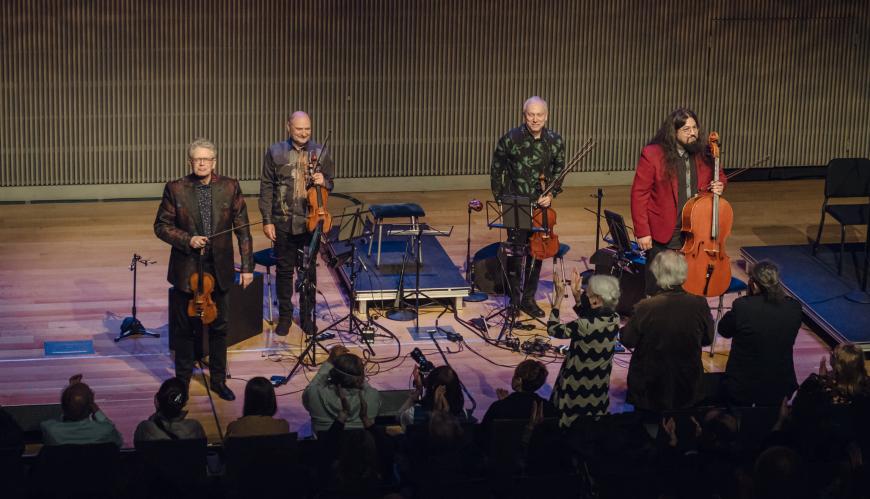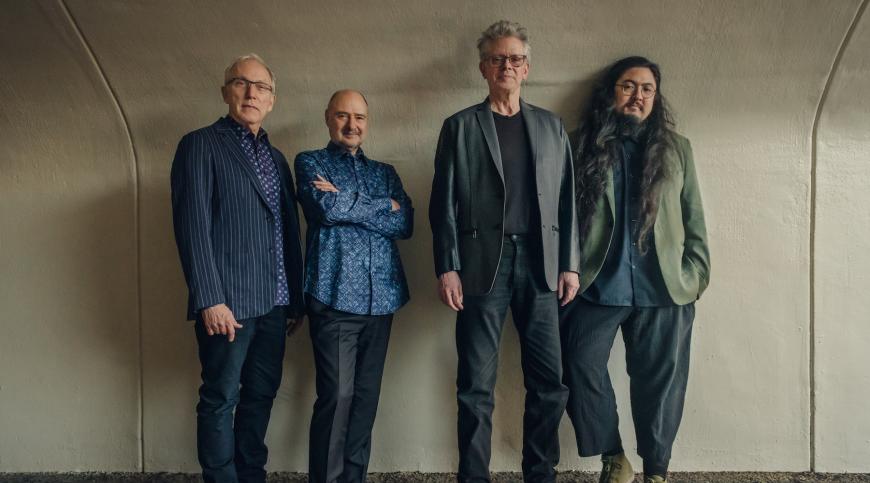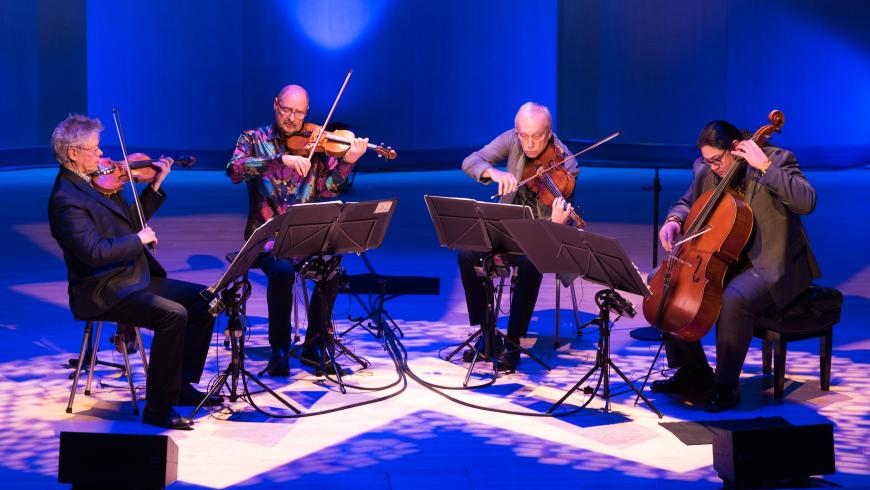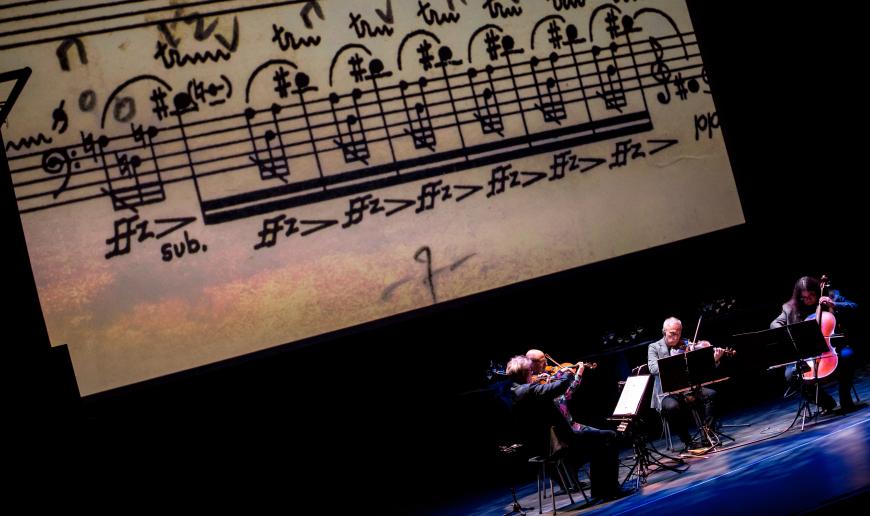
On Friday, the second day of last weekend’s Kronos Festival, the Kronos Quartet showcased its multifaceted enhancement of musical experience, in the process concluding its 50th anniversary season and honoring the retirements of violist Hank Dutt and violinist John Sherba. Manager Janet Cowperthwaite, who’s stepping down from her role with Kronos this fall, welcomed the players to their seats on the stage of SFJAZZ’s Miner Auditorium. Dutt, Sherba, and founder and violinist David Harrington were garbed in alluring but comfortable dark outfits, while cellist Paul Wiancko, winding up his first full season with the ensemble, wore one of his trademark imaginatively decorated jackets.
The concert launched with Montreal-based composer and videographer Nicole Lizée’s Black MIDI, a playful but inscrutable interplay between the Quartet and a projected film. The piece’s title refers to a musical genre that uses MIDI files to create music that is impossible for humans to play because of its overabundance of notes. The film included ticklish visual and aural references to the title, as well as depictions, on a blackboard and in woven yarn, of the densely packed score. Also pictured were a man interacting wildly with a metronome, a jigsaw puzzle of Harrington’s bespectacled boyish face, and an image of The Man From Another Place from David Lynch’s Twin Peaks.
The Quartet purposefully sounded smarmy or whiny but was always in faultless coordination. A section that had the four tearing newspaper pages drew giggles from the nearly full house. In another section, the players beat their strings with sticks. The audience seemed particularly amused by Lizée’s filming of flip-books, another facet of her deconstruction of musical technology.

Stanford-based composer Jonathan Berger’s Hajar Yasini was the longest of the evening’s several world premieres. The title references a quarry near Jerusalem, which long provided construction materials to that city. In an interview earlier on Friday, the composer discussed the genesis of the piece, noting that his wife is Israeli and that she has a schizophrenic brother still being cared for in that country. Berger said he’d been inspired by the tale of “a delusional guy being treated by a Palestinian physician [in a hospital] on the grounds of a cemetery in an obliterated village. This is at the heart of the Palestinian-Israeli conflict.” The former Palestinian town of Deir Yasin, where the quarry is located, was the site of a massacre in April 1948.
An accompanying film projected stark alabaster images of the quarry, which Harrington underscored with a shimmer on his violin, taken up by the other players and morphing into a collective groan. Seated beside the Quartet, poet Nathalie Khankan, in a calm, resonant voice, recited phrases such as “What can hands hold?” and “He didn’t know a dying would keep happening.” The piece had Kronos moving through a series of identifiable themes, some in Semitic modes. Berger’s affecting deployment of dynamics included a plaintive solo for Harrington, accompanied by the other strings, that then accelerated and crescendoed to fortissimo force. The impact felt timely and inevitable.
From Nunavut, the largest and northernmost of Canada’s territories, throat singer and improvisational vocalist Tanya Tagaq has been collaborating with Kronos for several years. Onstage Friday, she credited the ensemble with “inviting me to be a composer” and for “being a guiding light to so many artists.” Harrington in turn declared Tagaq “a great force in life.” The first of her original presentations was Sivunittinni (arranged by Jacob Garchik). After a magically murky invocation by the Quartet, Tagaq commenced a sensual vocalized arousal, showcasing her five-plus-octave range while gesticulating sinuously, the strings slithering with her.
Tagaq’s Watchwolf (arranged by Wiancko) was described in the program notes as being “about how we must be the most diligent while observing current social and political transgressions.” The shared understanding between singer and instrumentalists was most in evidence here, with Tagaq’s gestures seemingly matched by the players, her hoarse utterings provoking bursts from the strings. In other passages, she was bird-like or breathy, able to relocate her voice from the front of her oral and nasal cavities to deep in her throat. Taking a break to thank the audience, she announced, “Yes, this is my real speaking voice,” invoking laughter.
In her final offering, the brief Colonizer, Tagaq repeatedly screamed the piece’s title and the declaration “Oh, you’re guilty!” — an effective sort of musical purge. The string players undulated on their instruments behind her accusation. This performance ended with an audible gasp, not with a whimper.

A pair of premieres followed, developed in the Luna Composition Lab “for young female, nonbinary, and gender-nonconforming composers ages 13–18.” Tempus, by 16-year-old Peyton Nelesen, took the form of a mostly traditional quartet, sweetly proceeding in 3/4 moderato time. The piece’s structure was confidently shaped, and its themes were alluringly developed. Bonito … ’E, by 18-year-old María E, was an intoxicating exploration of syncopation and alternative sound-making. The score had the Kronos players clapping while bowing, sliding their flattened bows laterally up and down their strings, and percussing col legno. The audience greeted both young composers enthusiastically.
The concert’s closing act was very much in keeping with Kronos’s half-century commitment to social consciousness and political activism, but the work’s placement on a musical program was otherwise a bit of a head-scratcher. Active Radio saw stage left occupied by New York City radio journalist Brooke Gladstone and two lawyers, Dale Minami and Carmen Cheung Ka-Man. The three were there to explore the legacy of Fred Korematsu, the subject of a children’s book that Harrington’s daughter, Bonnie Quinn, has incorporated into her third-grade teaching curriculum. Minami represented Korematsu in his challenge of the Supreme Court’s 1944 ruling in Korematsu v. United States, which justified the internment of Japanese Americans during World War II.
Gladstone functioned as the moderator of an onstage discussion, as the Quartet, stage right, intermittently performed works by Wiancko and several longtime Kronos collaborators, including Terry Riley, Aleksandra Vrebalov, Laurie Anderson, John Oswald, and Michael Gordon. The result was something like interstitial music on an NPR station, though here the offerings were longer and more gratifying. I found myself torn between the two sides of the stage, the one satisfyingly musical, the other not very musical at all.

Nonetheless, Kronos’s good intentions of “getting to the people” with a hybrid of music and message (as Minami put it) was realized to better effect with the festival’s final offering on Sunday evening, a performance accompanying Sam Green and Joe Bini’s marvelous full-length documentary A Thousand Thoughts. There’ll be much more Kronos to come.




